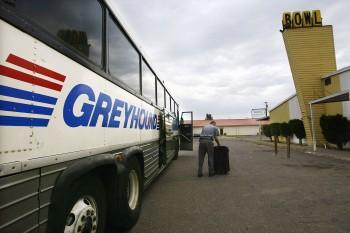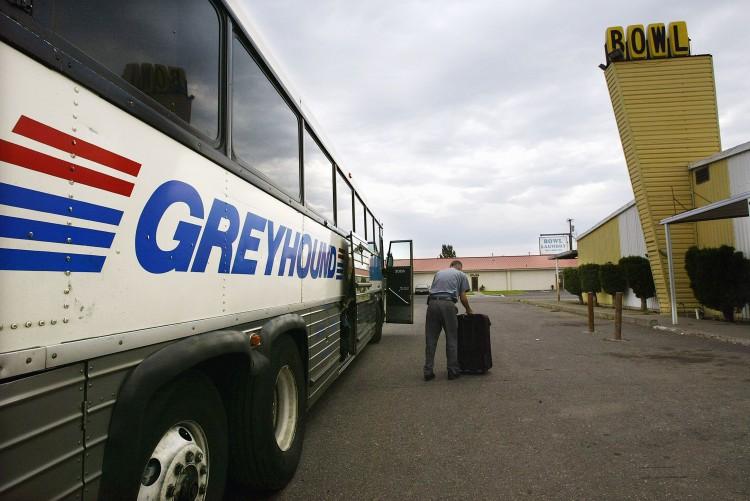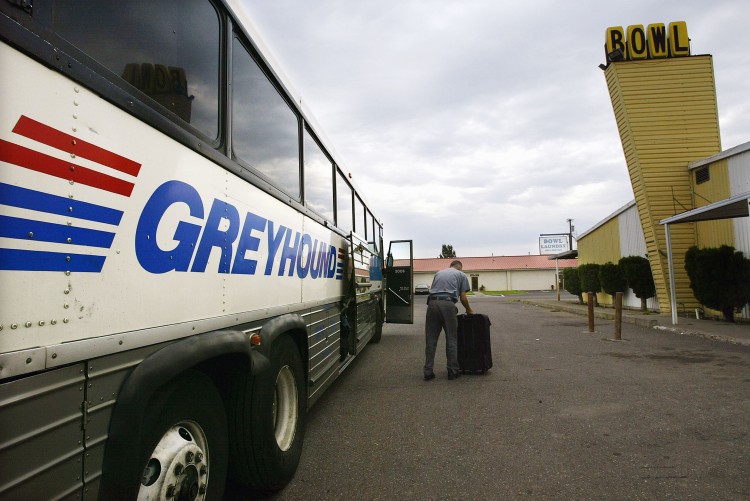Rural residents in central and northern Alberta are counting on start-up transportation companies to pick up the slack after Greyhound recently announced it will discontinue a dozen routes in the area by Oct. 24.
Some of the passenger routes to be cancelled include service from Edmonton to Drayton Valley, Slave Lake, Peace River, and Cold Lake. However, parcel service to these areas will continue.
North Darling, deputy mayor of Peace River, says a private company headed by local businessman Albert Cooper has already stepped forward to provide direct service from Peace River to Edmonton and will be in operation by Sept. 15.
He says many other affected towns are also looking to local existing or start-up companies to fill the transportation gap.
“For me, I’m a private businessman, so I don’t know why we would expect [Greyhound] to operate at a loss if we personally can’t. As a private service they have to do what’s best for them and we have to adapt to fill those gaps,” he says.
“We can complain all we want to Greyhound, but they’re not going to change their mind, so we have to move forward.”
The 12 routes were no longer profitable for Greyhound after a subsidy from the provincial government was cut in the 2011 budget.
While the company wasn’t receiving a subsidy as such, the government gave Greyhound exclusive rights on the busier, more cost-effective routes to make up for the losses on its service to rural areas.
Low ridership due to dwindling rural populations was also a factor in the route cuts. Greyhound said it was losing more than $7 million across Alberta.
Darling says Cooper’s new bus service, LuxLiner, will be an improvement over Greyhound. While the company will offer similar ticket prices to Greyhound, it will add features such as free Wi-Fi, roomier seats, and faster, more direct routes.
Sherri Bohme, executive director at the Cold Lake Chamber of Commerce, says she hopes new carriers will emerge and be successful, but worries that the business simply cannot be profitable with low levels of ridership.
“If the business case doesn’t work, it really doesn’t make sense.”
Bohme says the loss of service will mostly affect people who need to travel for medical service and temporary workers who travel to Cold Lake to work in the oil and gas industry.
“It will have some impact on people that are coming to our community for work. ... They have transportation lobbies here, but they still need to get to our community.”
Stephen Hutchings, Greyhound’s director of passenger services in Western Canada, says he is confident private companies will emerge to service the transportation needs of the outlying communities.
“I think the entrepreneurs will step up and propose to operate service along these corridors, whether that be with smaller vehicles or whatever that might be,” he says. “Obviously the Alberta government feels the exact same way.”
“We’re certainly willing to work with and assist any of these carriers that wish to apply a service,” he adds.
Some of the passenger routes to be cancelled include service from Edmonton to Drayton Valley, Slave Lake, Peace River, and Cold Lake. However, parcel service to these areas will continue.
North Darling, deputy mayor of Peace River, says a private company headed by local businessman Albert Cooper has already stepped forward to provide direct service from Peace River to Edmonton and will be in operation by Sept. 15.
He says many other affected towns are also looking to local existing or start-up companies to fill the transportation gap.
“For me, I’m a private businessman, so I don’t know why we would expect [Greyhound] to operate at a loss if we personally can’t. As a private service they have to do what’s best for them and we have to adapt to fill those gaps,” he says.
“We can complain all we want to Greyhound, but they’re not going to change their mind, so we have to move forward.”
The 12 routes were no longer profitable for Greyhound after a subsidy from the provincial government was cut in the 2011 budget.
While the company wasn’t receiving a subsidy as such, the government gave Greyhound exclusive rights on the busier, more cost-effective routes to make up for the losses on its service to rural areas.
Low ridership due to dwindling rural populations was also a factor in the route cuts. Greyhound said it was losing more than $7 million across Alberta.
Darling says Cooper’s new bus service, LuxLiner, will be an improvement over Greyhound. While the company will offer similar ticket prices to Greyhound, it will add features such as free Wi-Fi, roomier seats, and faster, more direct routes.
Sherri Bohme, executive director at the Cold Lake Chamber of Commerce, says she hopes new carriers will emerge and be successful, but worries that the business simply cannot be profitable with low levels of ridership.
“If the business case doesn’t work, it really doesn’t make sense.”
Bohme says the loss of service will mostly affect people who need to travel for medical service and temporary workers who travel to Cold Lake to work in the oil and gas industry.
“It will have some impact on people that are coming to our community for work. ... They have transportation lobbies here, but they still need to get to our community.”
Stephen Hutchings, Greyhound’s director of passenger services in Western Canada, says he is confident private companies will emerge to service the transportation needs of the outlying communities.
“I think the entrepreneurs will step up and propose to operate service along these corridors, whether that be with smaller vehicles or whatever that might be,” he says. “Obviously the Alberta government feels the exact same way.”
“We’re certainly willing to work with and assist any of these carriers that wish to apply a service,” he adds.






